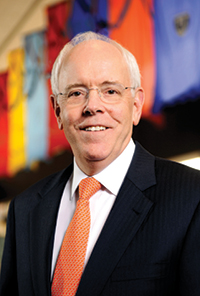Changing lives
 |
|
|
Wright Caughman |
Here at Emory we celebrate our faculty who are doing particularly high-impact research with the designation "Game Changers."
These are the scientists and physicians whose innovations and discoveries have profoundly transformed the understanding and practice of medicine worldwide. Two of the faculty members who have been honored with the title, Dr. Mahlon DeLong and Dr. Helen Mayberg, are featured in this issue of Emory Medicine. These pioneers, along with their colleagues, are using deep brain stimulation (DBS)—sending electrical impulses to electrodes surgically implanted in targeted areas of the brain—to reduce or eliminate the symptoms of conditions such as treatment-resistant depression, movement disorders, and epilepsy. As you’ve seen in the DBS feature earlier in the magazine, their advances are returning hope to patients whose chronic conditions had formerly seemed hopeless.
Across the Woodruff Health Sciences Center (WHSC), we have the great fortune to be surrounded by many pioneers who meet the "Game Changers" criteria, even if they haven’t yet been officially honored as such. In the Nell Hodgson Woodruff School of Nursing, the Rollins School of Public Health, the Winship Cancer Institute, and Yerkes National Primate Research Center, and Emory School of Medicine, our faculty are discovering and perfecting novel methods for preventing, detecting, and treating conditions that take far too much from far too many. In fields such as cancer, cardiovascular health, transplant, neuroscience, orthopedics, child health, and many others, WHSC faculty are developing high-impact research that will ultimately benefit not only the people we serve here at Emory, but also people in need around the world.
For the patients they serve, Drs. Mayberg and DeLong, and all the investigators on the Woodruff Health Sciences Center faculty, aren’t just game changers; they’re life changers.





